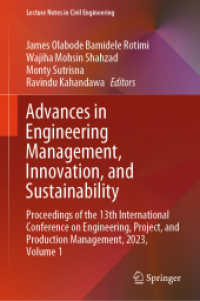- ホーム
- > 洋書
- > ドイツ書
- > Social Sciences, Jurisprudence & Economy
- > Education Science / Pedagogic
- > didactics, methodics, school education
Full Description
This book explores analogue game-based learning in the context of the Anthropocene, addressing an urgent need for educational approaches beyond traditional scholastic boundaries.








